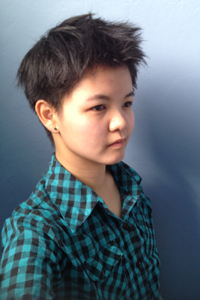Would you pay to set something free? A poor, small creature locked away in confinement perhaps? From behind bars, its eyes meet yours as if to say: "Save me." So delicate. So pitiful. And if you do nothing, who knows what's going to happen to it? You take your wallet out. Hand over a few bills to the seller, who has handful of cages on him. And soon you let it go. Be it bird, fish, turtle or other. Fly free. Swim free.
Making merit always brings a sense of relief. It brings us peace of mind to be kind, to save a life. Merit has been on delivery, like food. It finds us through random uncles and aunties with smiles on their faces and cages of birds full on both arms. In other settings, it's different kind of aquatic animals held inside plastic tubs, often found at markets or temples by the river. These are very familiar scenes that take place all over Thailand, whether at temples, by the river, or even at the tombs on Chingming Day.
I was like that, too. As a kid, I was always asking my parents when I saw people carrying small cages filled with little birds for sale, wondering if I could make merit by setting them free. Many times, if the price was OK, my parents relented and soon I would have that cage in my hands. With head bowed in a random prayer, I flicked the cage open. Fly free, birdies.
It wasn't until I was older that I started asking the real question: What exactly have I been doing? What exactly have we all been doing to support this vicious cycle of animal cruelty for our own false belief? And for decades, too.
That question came back last week when news emerged about an old lady who sold sparrows for people to make merit. From the pictures, those sparrows were kept in individual plastic bags with only tiny holes in them so they could breathe, not inside packed cages we are used to.
The scene took place at a morning market in a rural province. According to the news, the lady reportedly said someone caught those birds for her to sell. While she didn't want to do it, it was means for her to provide for her poor family.
Thai people are kind. And when there's an opportunity for merit making, we can't resist. That's not in our nature. Millions of baht were raised for the recent flood, and also for hospitals, temples, disaster relief and many others. On a smaller, streetwise scale, we direct our cash to animals (and sometimes human) in need -- from saving cows and buffaloes from a slaughter house, to feeding random elephants that walk around the city with their mahouts, to paying to set birds and fish free. We are kind that way. Kind, and maybe delusional and careless, too.
There have been arguments surfacing before about fish. Mostly, people buy fish that have been caught and pretty much just dump them into whatever klong happens to be nearest, often without realising the impact it'll bring to the local ecosystem or to the fish's well being. Is it even the right kind of place or water to release the fish into? We don't know. We aren't even aware we need to know. This makes us feel good, enjoyed and relieved, and so we continue to do so without wondering much about anything else.
Why do we need to set those creatures free anyway? How did they end up in cages? Weren't us human the ones who put them there? And why are we paying someone for holding helpless animals ransom? Those animals wouldn't be held captive or need to be set free if someone hadn't taken them away from their habitat in the first place.
Beliefs and practices are passed from generation to generation, going on for decades. And we don't even know who started it. We keep to certain traditions without asking questions or realising that our very own actions are keeping the cruel, sinful wheels turning.
Is it now time we start asking questions? Wonder about more than what meets the eyes? Question whether it's actually the right thing to do and who really is the one benefiting from our careless kindness? It's time to stop perpetuating this vicious cycle. Our act of goodwill may satisfy our conscience, but it is robbing the freedom of others.
Melalin Mahavongtrakul is a feature writer for the Life section of the Bangkok Post.
